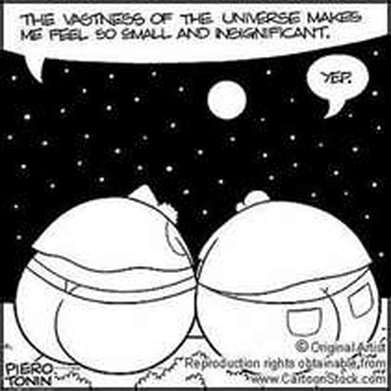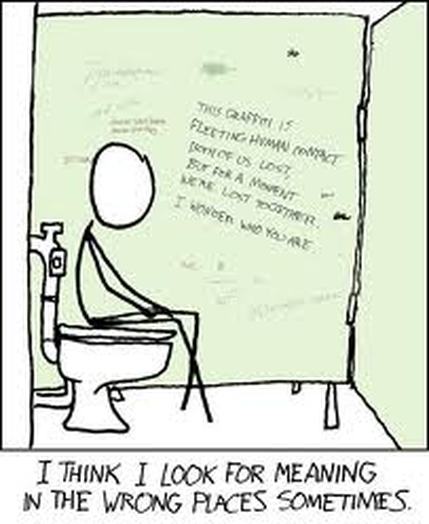If you have ever had a problem answering the question, 'what is the meaning of life?" or its many themes and variations then you are in the right place. Let us consider the mechanics and social circumstances in which the 'big M' question arises and why it is understandably and very often avoided.
The annoying question

blogquestionpro.com
Does the question, "what is the meaning of (your) life?"
annoy you?
"Does life have meaning? Before the question is asked, we live in a state of innocence. But once the question becomes a question, once we ask whether life is meaningful, there is no turning back. The possibility that our lives may be pointless leaves us naked and vulnerable. All of us seek a life of meaning and purpose, but finding such a life is difficult.
Thoreau was wrong when he observed that most of lead lives of quiet desperation. Most of us, I think lead lives of denial."
The Search for Meaning Dennis Ford p-xi
If someone poses you with this ancient philosophical quandary do feel you are being set up, that you are about to have your existential sensibilities put to the test?
annoy you?
"Does life have meaning? Before the question is asked, we live in a state of innocence. But once the question becomes a question, once we ask whether life is meaningful, there is no turning back. The possibility that our lives may be pointless leaves us naked and vulnerable. All of us seek a life of meaning and purpose, but finding such a life is difficult.
Thoreau was wrong when he observed that most of lead lives of quiet desperation. Most of us, I think lead lives of denial."
The Search for Meaning Dennis Ford p-xi
If someone poses you with this ancient philosophical quandary do feel you are being set up, that you are about to have your existential sensibilities put to the test?
The Problem of the question of meaning

pushingsocial.com
“The search for the purpose of life has puzzled people for thousands of years. That’s because we typically begin at the wrong starting point-ourselves. We ask self-centered questions like, “what do I want to be? What should I do with my life? What are my goals, my ambitions, my dreams for the future?”
From The Purpose Driven Life (What on Earth Am I Here For?) A booklet by Rick Warren p-5
From The Purpose Driven Life (What on Earth Am I Here For?) A booklet by Rick Warren p-5
The question of meaning has a deeply problematic quality. It has an odd or counter-intuitive propensity of not being like other questions. It will not be subjected to a simple right or wrong response. Many who seek to answer it, begin with a bias, toward the question before it is even asked. For example, those with a a religious belief system and those with a modern scientific worldview will build their replies around a certain set of assumptions associated with their beliefs about reality. Still others may respond to the question saying "what is the meaning of life?" asserting that meaning like consciousness itself is little more than illusion. Moreover, the question of meaning seems unavoidably contextualized in something of an all or nothing proposition. Most of us are under the assumption that we either have the right answer or the wrong answer.
The question of Meaning can seem intrusive & illicit an awkward social dynamic

cartoonstock.com
"Talking openly about meaning and meaninglessness is one of the last taboos. The question of meaning makes us uncomfortable."
“To ask whether life has meaning is subversive because it implies that the meaning we are supposed to find in life-as defined by parents, Church, career, culture, and politics-is found wanting. To ask whether life has a meaning is to challenge and subvert the legitimacy of the answers others provide.”
Dennis Ford The Search for Meaning p-xv & xviii
“To ask whether life has meaning is subversive because it implies that the meaning we are supposed to find in life-as defined by parents, Church, career, culture, and politics-is found wanting. To ask whether life has a meaning is to challenge and subvert the legitimacy of the answers others provide.”
Dennis Ford The Search for Meaning p-xv & xviii
In New York City there are several religious organizations who send out the 'workers' to knock on doors and "evangelize". I am one of the few people who probably does not hide, close the curtains and or let the dog out! I will allow these well-intentioned and often misled individuals, to go through their scripted routine which usually amounts to an introduction a recital or a statement of facts about the certain prophesized fate or our doomed world and several leading questions designed to spark a conversation. The witnesses, evangalizers or workers are usually taught to get to know the 'lost' and identify or expose the ignorance of the 'unsaved' toward the one true religion. These religions, what some refer to as cults, usually adhere strongly to the belief that their particular organization is the one true entity, God's very representatives on Earth and responsible for saving as many as is possible from hell or leading a pointless existence of futility like blind souls lost in darkness. With stakes as high as these it is relatively easy for these institutions to inspire these individuals, layman, servant-workers, to go out into the world and warn sinners of their impending destiny. There are several problems with this approach as it concerns the question of meaning.
For one,it violates some very fundamental characteristics of human communication. The questions of belief, destiny of the soul and the model of meaning that one has invested their trust in is deeply personal even intimate. A socially normal conversation concerning belief and meaning is one that would under most circumstances take place between friends and with family or in a special or unique moments by invitation. Meaning like love is probably best, and most comfortably approached when we have a sense of safety and can be honest without fear of judgement or manipulation.
For one,it violates some very fundamental characteristics of human communication. The questions of belief, destiny of the soul and the model of meaning that one has invested their trust in is deeply personal even intimate. A socially normal conversation concerning belief and meaning is one that would under most circumstances take place between friends and with family or in a special or unique moments by invitation. Meaning like love is probably best, and most comfortably approached when we have a sense of safety and can be honest without fear of judgement or manipulation.
"To ask whether life has meaning is subversive because it implies that the meaning we are supposed to find in life-as defined by parents, Church, career, culture, and politics-is found wanting. to ask whether life has meaning is to challenge and subvert the legitimacy of the answers others provide."
The Search For Meaning Dennis Ford xvii
The Search For Meaning Dennis Ford xvii
The question of meaning often presents itself in difficult times
and places we would rather avoid
"Man's search for meaning may arouse inner tension rather than inner equilibrium. However, precisely such tension is indispensable prerequisite of mental health. There is nothing in the world, I venture to say, that would so effectively help one to survive the worst conditions as the knowledge that there is meaning to one's life."
Viktor Frankl, Man's search for meaning p-103-104)
"Our beliefs and actions require no justification or explanation, because we take the world for granted. as long as we are immersed in culture, we are not challenged to step back from or step outside of day-to-day living to ask: "why"."
Dennis Ford The Search For Meaning p-8
Few of us can completely avoid the question of meaning forever. When we lose someone important to us, have personal close calls or life-threatening sickness, when a romance or friendship suddenly changes, or a career & job fails to meet our expectations we are often compelled to consider the reality of the shortness or fragility of life and its meaning and the value of what we think is important. Sometimes a movie may coerce us to contemplate the importance of life, its unpredictable shortness and most certainly its meaning. Think of Titanic, The Bucket List, The way we were, About Schmidt, Star trek II -Wrath of Khan (when Spock dies), Frosty the snowman. Kidding about the last one.. Or two! A good movie, or story, sometimes even a not so good movie, will draw us in and compel us to identify with a character(s) and very often their struggle to find purpose in their struggle for meaning. This includes stories about love lost and found, tragedy, loss of identity, rebellion, getting old, dying etc. An effective movie, book or story will bring us to a place where we are almost forced to really think about things in a safe and objective setting. More importantly stories can remind us in a very subtle and creative way what is actually important in life.
For many of us the confrontation with the question of meaning comes at those very difficult times in life. One that strikes hard at most of us is the loss of a parent or parents. We suddenly find ourselves separated from our own beginnings in life and reminded of our own inevitable demise. Others, after years of love and trust or strong sense of belonging discover an intimate relationship to be deteriorating, change or suddenly end. Many also are confronted with the notion of purpose when their children grow up and leave home and they begin to feel less important than in seasons past. The question of our own personal meaning very often strikes when we are confronted with and realize that our that life does not go on forever.
How many stories have we heard or personally experienced in going to the doctor or hospital and discovering a serious illness or condition is very capable of shortening our life or someone we love. It should be blatantly obvious why so many of us think deeply about the meaning of life in difficult times like these. Unfortunately, few of us really prepare for these inevitable moments. However, we do not have to think of it as something morbid, rather, it should be a reminder of the wonder and goodness of life while we possess it.
For many of us the confrontation with the question of meaning comes at those very difficult times in life. One that strikes hard at most of us is the loss of a parent or parents. We suddenly find ourselves separated from our own beginnings in life and reminded of our own inevitable demise. Others, after years of love and trust or strong sense of belonging discover an intimate relationship to be deteriorating, change or suddenly end. Many also are confronted with the notion of purpose when their children grow up and leave home and they begin to feel less important than in seasons past. The question of our own personal meaning very often strikes when we are confronted with and realize that our that life does not go on forever.
How many stories have we heard or personally experienced in going to the doctor or hospital and discovering a serious illness or condition is very capable of shortening our life or someone we love. It should be blatantly obvious why so many of us think deeply about the meaning of life in difficult times like these. Unfortunately, few of us really prepare for these inevitable moments. However, we do not have to think of it as something morbid, rather, it should be a reminder of the wonder and goodness of life while we possess it.
Over three thousand five hundred or so years ago King Solomon made this observation concerning this very situation;
“It is better to go to a house of mourning than to go to a house of feasting, for death is the destiny of every man; the living should take this to heart. Sorrow is better than laughter, because a sad face is good for the heart. The heart of the wise is in the house of mourning, but the heart of fools is in the house of pleasure. It is better to heed a wise man’s rebuke than to listen to the song of fools”
Ecclesiastes 7:2-5
“It is better to go to a house of mourning than to go to a house of feasting, for death is the destiny of every man; the living should take this to heart. Sorrow is better than laughter, because a sad face is good for the heart. The heart of the wise is in the house of mourning, but the heart of fools is in the house of pleasure. It is better to heed a wise man’s rebuke than to listen to the song of fools”
Ecclesiastes 7:2-5
Here Solomon gives us one clue about the problem of meaning. It is not found in the midst of the party, but, very often, in in circumstances that display the harsh reality of life. Let's face it, most of us are not inclined to be around or attend to those in the midst of life's great loss. This does not make us bad people. Many of us do try and even drive long distances to join family and friends we have not seen in years to offer some comfort and support when an individual passes away. This helps and is honorable! What is being conveyed here I believe goes much deeper. It is a willingness driven by wisdom that acknowledges the reality of life's greatest challenges. To look hard into the problem of what will come upon us all sooner or later, to have some moments of deep sharing in this process and cling to one of life's greatest secrets why we can still grasp its significance. There is a profound sense of meaning we have in knowing that life is but a breath and perhaps a part of wisdom is not being overcome by this fact but rather make it a part of our story. A knowledge that leads us to more compassionate thinking and leading compassionate lives.
I am in no way implying we become obsessed with the shortness of life, pain and suffering. In fact the quote above comes from a book that is perhaps the oldest and most extensive document on the question and problem of meaning and builds it premise on principles of thinking and balancing certain essential elements of the human experience and living not dying. Here are some of the examples that Meaning Tree touches on which are themes of the book of Ecclesiastes and strangely familiar even in modern living; a time for birth and death, tearing down and building up, weeping and laughing, mourning and dancing, scattering and gathering, embracing and refraining, searching and giving up, possessing and throwing away, tearing apart and mending, being quiet and speaking, loving and hating, and a time for war and peace.
(Ecclesiastes 3:1-8)
I am in no way implying we become obsessed with the shortness of life, pain and suffering. In fact the quote above comes from a book that is perhaps the oldest and most extensive document on the question and problem of meaning and builds it premise on principles of thinking and balancing certain essential elements of the human experience and living not dying. Here are some of the examples that Meaning Tree touches on which are themes of the book of Ecclesiastes and strangely familiar even in modern living; a time for birth and death, tearing down and building up, weeping and laughing, mourning and dancing, scattering and gathering, embracing and refraining, searching and giving up, possessing and throwing away, tearing apart and mending, being quiet and speaking, loving and hating, and a time for war and peace.
(Ecclesiastes 3:1-8)
- The problem with the question of meaning is it will sneak up on us when we have the least mental strength to deal with it. We usually give it thought after tragedy strikes, sickness, the loss of loved one or some other challenging circumstances imposes itself on our lives.
The question of Meaning is as paradoxically important as it easy to ignore

www.cartoonstock.com
In his book The Search For Meaning, Dennis Ford gives an account of being with a group of software and electrical engineers over lunch and the question of meaning arose he offered this observation,
“Talking openly about meaning and meaninglessness is one of the last taboos. The question of meaning makes us uncomfortable…Our era is distrustful of and uncomfortable with high-sounding abstractions that tend to begin with capital letters, such as Truth, Reality, and Meaning. Speaking of these things elicits the same awkwardness many of us feel when we attend a funeral.”1
In modern living, the daunting task of answering the question of meaning, despite its importance, is consciously filed away with many other problematic questions, while we get on with our daily challenges. Because it is generally considered the norm, we all in a sense accept the temporary fix of getting a job, to pay for things and bills till we eventually find something which will fill that place the void that the lack of meaning. In other words we come to accept that living with purpose is a replacement for knowing the meaning of life. However, in the end what most of us end up with is a life that is fundamentally complex any how and perhaps even seemingly pointless!
In a profound or paradoxical sense the more we ignore meaning the more likely we will be driven to pursue purpose in other things. Pursuits that will in success or failure lead us back to the question of meaning.
The question of meaning forces us to consider relational contexts

Maraahmed.com
Like love meaning is inherently rooted in relationship and context.
There is simply no philosophical approach that can avoid the need of meaning to be answered according to how we relate to ourselves, the cosmos a creator (if we so choose to believe) values and of course other people.
The purpose driven life by Rick Warren is perhaps one of the greatest selling book of all time. It opens with the basic four word premise "Its not about you". I agree. Many don't understand this. Is it not my purpose I am seeking. Is it not about solving my problem of what or what not I should be doing with my life? Yes. But not exactly. There is subtle but significant truth here. Obviously, as our days wind down, or we suddenly find ourselves with several months to live, it is our life that we will have to answer for. Our failed endeavors, unfulfilled dreams, wasted talents, betrayals,broken promises & relationships will all converge to speak to us concerning what it all comes down to or adds up to. However, this moment like many other introspective one, that come and go in the most honest moments of life will, I do not believe, testifies to scope of the question of meaning. Rather this moment of judgement, for lack of a better term, will more than likely return us to our most fundamental problem of consciousness and of being human. Who am I? What is my purpose? Why? anything rather than nothing? We only have two choices. We believe that we are designed for a purpose with a relationship to something much bigger than ourselves, or, we simply fade out of time and existence and rot in a hole. All relationships become significant, and it is not about us. It is not about me but, but a much larger context. It seems that the way in which we perceive, relate to and consider these relationships will determine ultimately whether or not our choices truly matter. One way or the other, this hierarchy of contexts and relationships will inevitably lead us back to the question of why something rather than nothing and does it all (everything) have a purpose? This is usually the part of the meaning question that most have given up on, including philosophers as well as many of histories greatest thinkers.
A brief consensus of meaning

"He who has a Why to live for can bear almost any How."
Nietzche
Meaning is very much about our dreams, beliefs and what we do, but perhaps more, about who we are.
"What is the meaning of life?"
"What is the purpose of my life?"
Nietzche
Meaning is very much about our dreams, beliefs and what we do, but perhaps more, about who we are.
"What is the meaning of life?"
"What is the purpose of my life?"
Answering the above questions is very challenging, as they possess a complex & multifaceted nature leading to other questions concerning our understanding of life, morality, life after death and of course our most precious gifts, time and consciousness itself. These queries may also lead us to ask about those universal conundrums, the qualities that make us significant as a species and individuals in an enormous cosmos that seems indifferent to our presence? Perhaps, most importantly, at least for some, the questions; is there is a God or why there is anything and everything rather than nothing? Is there an overall scheme or purpose to it all and again, what is my potential purpose in all of this?
These deeply difficult questions have been challenging thinkers since the dawn of history, and have a tendency of suddenly and very personally conspiring on us, often without warning, attacking our sense of security, intruding on our delicate sense of psychological balance. When we loose someone close to us, an important relationship sours, loss of a job, a severe accident, unexpected sickness or other life altering episode, we may be led back to the deeply personal questions, "what is the meaning or purpose of this?" Some end up embracing an answer or solution of a generic type that is religious or spiritual in nature. Others choose to ignore or give up on the question of meaning altogether and proclaim with many modern thinkers that; 'meaning is an illusion'.
Interestingly, even those of us who adopt this approach or worldview, will nevertheless, and I believe, correctly declare that their lives do have purpose. For some mysterious reason many are almost always instinctively drawn to include the concepts of love, family, friendship, service of community or country, as well as a healthy personal intellectual & psychological state. They will all, I suspect, parent their children to pursue a life of success as a measure of purpose in life. Yet, many avoid or deny the question of meaning altogether. It is as if they see the importance of building a large, functional and even aesthetically pleasing looking house, without seeing the necessity for the existence of a foundation.
I think it would be safe to say that most avoid the question of meaning altogether particularly the majority of younger souls and it is now the cultural norm, in many places, to scoff at the question altogether. Others have traditionally sought answers in religion in order to, at the very least, address these problems that the question of meaning imposes on us. However, in modern thinking less of us are inclined to depend solely on institutionalized religion for answers, yet, we are still left with finding adequate enough ways of coping with all the problems these questions raise. Add to all of this is the more practical issue that the question of meaning presents; how do I lead a purposeful life and not fall into the trap of living a pointless or wasted life?". Many do not even get this far and we are only beginning to touch the tip of the iceberg of understanding the questions and broad scope of the problem of meaning.
These deeply difficult questions have been challenging thinkers since the dawn of history, and have a tendency of suddenly and very personally conspiring on us, often without warning, attacking our sense of security, intruding on our delicate sense of psychological balance. When we loose someone close to us, an important relationship sours, loss of a job, a severe accident, unexpected sickness or other life altering episode, we may be led back to the deeply personal questions, "what is the meaning or purpose of this?" Some end up embracing an answer or solution of a generic type that is religious or spiritual in nature. Others choose to ignore or give up on the question of meaning altogether and proclaim with many modern thinkers that; 'meaning is an illusion'.
Interestingly, even those of us who adopt this approach or worldview, will nevertheless, and I believe, correctly declare that their lives do have purpose. For some mysterious reason many are almost always instinctively drawn to include the concepts of love, family, friendship, service of community or country, as well as a healthy personal intellectual & psychological state. They will all, I suspect, parent their children to pursue a life of success as a measure of purpose in life. Yet, many avoid or deny the question of meaning altogether. It is as if they see the importance of building a large, functional and even aesthetically pleasing looking house, without seeing the necessity for the existence of a foundation.
I think it would be safe to say that most avoid the question of meaning altogether particularly the majority of younger souls and it is now the cultural norm, in many places, to scoff at the question altogether. Others have traditionally sought answers in religion in order to, at the very least, address these problems that the question of meaning imposes on us. However, in modern thinking less of us are inclined to depend solely on institutionalized religion for answers, yet, we are still left with finding adequate enough ways of coping with all the problems these questions raise. Add to all of this is the more practical issue that the question of meaning presents; how do I lead a purposeful life and not fall into the trap of living a pointless or wasted life?". Many do not even get this far and we are only beginning to touch the tip of the iceberg of understanding the questions and broad scope of the problem of meaning.
If you read this far and your head may already be spinning!
Don't fear. You are not alone.
Don't fear. You are not alone.
Sadly, few of us ever get past the generic answers to the question of what is the meaning of life, and simply end up procrastinating on answering it, or simply give up on it altogether and ignore it. This is largely because of our attitude towards the question, believing that it's answer should come to us as it does like other questions, in a definite academic right or wrong form.
An answer that is universally the same for everyone.
Though meaning or purpose of life certainly has many unalterable universal qualities it will not be limited to a generic type approach.
An answer that is universally the same for everyone.
Though meaning or purpose of life certainly has many unalterable universal qualities it will not be limited to a generic type approach.
What is being considered at Meaning Tree (www.meaningtree.org)
is whether or not the pursuit of meaning or purposeful living is like the pursuit of love. Perhaps, much more of a process of discovery than a mere intellectual exercise. A process of discovery that can be enjoyed and with some time and energy can itself become a catalyst for both answering the question of meaning in a deeply personal way while leading to fuller more satisfying life.
is whether or not the pursuit of meaning or purposeful living is like the pursuit of love. Perhaps, much more of a process of discovery than a mere intellectual exercise. A process of discovery that can be enjoyed and with some time and energy can itself become a catalyst for both answering the question of meaning in a deeply personal way while leading to fuller more satisfying life.
Target points

- The question of meaning, has justifiably, for many, been perceived as intrusive
- The question of meaning often presents itself in difficult times and when we have the least mental and emotional resources to deal with its complexity.
- The question of meaning is as paradoxically important as it is easy to ignore.
- The question of meaning seems to force us to consider relational contexts. Our relationship to our own being, beliefs, passions, thoughts (internal talk), dreams, and choices (why and how we choose between right and wrong - hierarchy) and our expectations for life.
- The question of meaning will also compel us to contextualize our actions and what we value as well. Our work, recreation and perhaps most importantly our intimate relationships such as family and close friendships. All of these features of life are integral to our perception of purpose in life and ultimately meaning.
- The question of meaning almost always implores a larger context,. and therefore, It will logically lead to the consideration of why there is something rather than nothing and the existence of a creator or purpose for creation.
- A modern consensus of the question of meaning would probably lead us to think that most individuals feel it is best left unasked!
